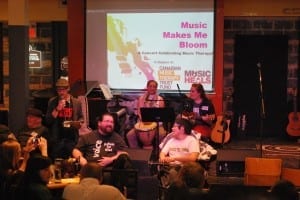Music therapy helps process the pain

Singin’ and performin’ heals the brokenhearted
On Sunday, Mar. 22, the Artful Dodger hosted “Music Makes Me Bloom,” a music therapy concert. For two hours, music therapists and their patients alternated taking the spotlight and performed songs of their own creation or covered ones that held meaning in their lives.
The venue was packed with supporters, and the event raised more than five hundred dollars for the Canadian Music Therapy Trust Fund and Music Heals.
Performances were diverse. The stage was at times filled with a large group, and at times showcased a duet. One group, the Reel Anti-Suppressants Popular Theatre Group, combined music and sketch comedy to raise awareness about mental health, poverty, and race. Another young adult group from Wascana Rehabilitation Centre sang “It’s All About the Wheels,” their reworked version of Meghan Trainor’s “All About That Bass.” Other performances included a young teenager playing a song from Zelda on the piano, a recording of a brother and sister who wrote a song to work through the grief of losing their grandmother, a rocking rendition of Johnny Cash’s “Ring of Fire,” by The True Rock Singers O’ Mine, and many more.
Bernadette Kutarna is a music therapist who accompanies the Reel Anti-Suppressants and other groups. She has been a music therapist for 38 years and says she still loves the job because it allows her to interact with people and play music all day.
“I’ve always been involved with music. My mother’s a music teacher. I don’t remember the first time I heard music. Probably in-utero somehow,” Kutarna laughed.
Work as a music therapist varies considerably. Patients’ needs and interests shape the work that music therapists, and ultimately the patients, do with music.
“What I like to do is just spend some time with an individual and just create music,” said Kutarna. “It’s person centered. [You] spend time with them, doing whatever it is they want to with music, then work on their focus. Very frequently it has to do with communications skill building.”
Communications skill building is split into two focuses: receptive language and expressive language. Music therapists assist with both types of communication, but often in tandem with other health care professionals. One group on Sunday had flash cards that displayed text as well as symbols to accommodate the performers who couldn’t read. In similar ways, occupational therapists and speech language pathologists are often involved with music therapists to improve expressive language.
“So in a way, although people are really enjoying what they’re doing in music, what I’m doing as a musical therapist is thinking about what is it that is going to be useful for this person to help them organize their cognitive processes,” Kutarna explained. “If I’m working with an individual, they may be working on guitar, or voice, or whatever they’re choosing, and my thinking process is how do I keep them engaged and highly expressive, and how is it that the music — what kind of pitches and what kind of sounds — assists that person in working on whatever goal there is. Music therapy is very focused…you have goals and objectives that you work at with an individual. Their process is very much whatever they make of it, too. So it’s very much a combination of a participant in a music therapy session as well as a facilitator, who would be a music therapist.”
Though it is often widely agreed that music is powerfully influential, Kutarna explained that scientifically, the effects of music therapy can be immediate, though are often residual.
She stated, “The research shows that usually, if you are involved with music making of any sort, the residual effect is actually minutes or hours after. However, the research into brain plasticity shows that being actively involved with brain makes changes to the brain.”
Indeed, music must alter a person’s consciousness, and it is difficult to argue that it could do so in a negative way. Sunday’s event was a testament to how music can positively impact both performers and audiences.











This sounds amazing, wish I could have been there. Mel at bestbinauralbeats